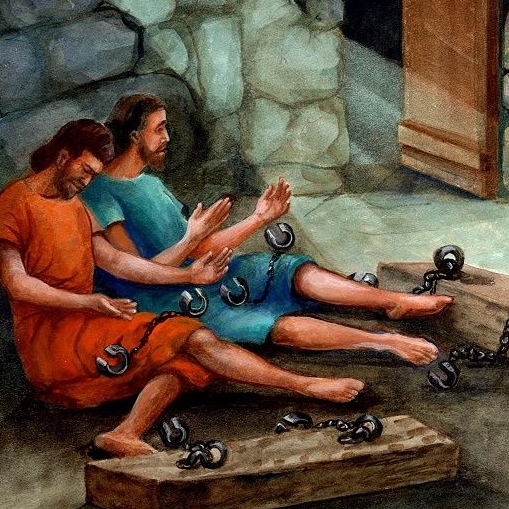Today is Pentecost Sunday in some traditions. Jesus’ last recorded words on earth in Acts 1:8 give a clear definition of what that should mean for us today:
i) A clear experience of the empowerment of the Holy Spirit: “You shall receive power when the Holy Spirit has come upon you.”
ii) What we should expect as a result of that: “you shall be witnesses to Me in Jerusalem, and in all Judea and Samaria, and to the end of the earth.”
Both i) and ii) are promises to receive today. Both should radically change us. Silas (or Silvanus) in the New Testament is a wonderful if little known example of that. In Acts 15 the Jerusalem church leadership wanted the churches outside Jerusalem to know about an important decision they had made. Enter Silas. “It seemed good to the apostles and the elders, with the whole church, to choose men out of their company, and send them to Antioch with Paul and Barnabas; namely, Judas called Barsabbas, and Silas, chief men among the brethren” (15:26-27). Silas was a full of the Holy Spirit brother who could be trusted. He delivered the letter and then “Judas and Silas, themselves being prophets also, exhorted and strengthened the brethren with many words. And after they had stayed there for a time, they were sent back with greetings from the brethren to the apostles” (vv32-33). Job done by Silas in the power of the Holy Spirit. Deliver the letter, build up the church and back home to Jerusalem.
But then comes Acts 15:40-41: “But Paul chose Silas and departed (on his second missionary journey)… And he went through Syria and Cilicia, strengthening the churches.” Stop right there: Silas was well settled as a prominent member of the early Christian community in Jerusalem. Paul had just had a bust-up with Barnabas over John Mark (15:36-39, see last Sunday’s comments) and that led to their separation. Paul needed a companion to replace Barnabas. He chose Silas. Silas responded by leaving all he had worked for in Jerusalem to be a missionary with Paul.
It was tough. During their missionary journey, Paul and Silas encountered opposition and faced imprisonment in Philippi (Acts 16:16-40). Verses 23-24 tell us that “when they had laid many stripes on them (Paul and Silas), they threw them into prison… the jailer put them into the inner prison and fastened their feet in the stocks.” But while in jail, they praised God! An earthquake occurred, leading to their release. The jailor and all of his household came to Christ and the church within the city of Philippi was birthed.
Silas had paid a huge price. But he didn’t run, he held firm and saw the glory of God inside the prison.
In chapter 17 Silas accompanied Paul to Thessalonica. “And some of them were persuaded; and a great multitude of the devout Greeks, and not a few of the leading women, joined Paul and Silas” (17:4). But again they faced significant opposition from the Jews who were hostile to the message of Jesus, and the Jews then stirred up a mob. Paul, Silas and Timothy escaped to Berea. Silas remained there in Berea while Paul went to Athens.
Silas then joined Paul again in Corinth. Paul later wrote “Jesus Christ.. was preached among you by us, even by me and Silvanus and Timothy” (2 Cor 1:19)
Silas could work under Paul . He could also be left to take care of the mission business when Paul was not there. He, along with Timothy, provided ongoing support and guidance to the newly established church in Thessalonica, helping them navigate challenges and grow in their faith.
Silas is only mentioned in two of Paul’s letters, in 1 Thessalonians 1:1, Paul writes, “Paul, Silvanus, and Timothy, to the church of the Thessalonians…” and similarly in 2 Thessalonians 1:1. Silas had a close association with the Thessalonian church and also had ongoing involvement in their spiritual well-being. His teaching, support, and endurance in the face of persecution contributed to the development of a thriving Christian community in the city. Thessalonica was a cosmopolitan city with a diverse population. Silas in the power of the Holy Spirit communicated the Gospel effectively to both Jews and Gentiles in Thessalonica.
Peter also mentioned Silas in 1 Peter 5:12: “By Silvanus, our faithful brother as I consider him, I have written to you briefly, exhorting and testifying that this is the true grace of God in which you stand.”
Silas walked away from his secure place in the Jerusalem church to take the gospel to the ends of the earth. Silas stood fast in prison, persecution and in seeing the glory of God in the new churches. He was a missionary who succeeded by being faithful from beginning to end. Silas was a model Pentecost Sunday man, a model Acts 1:8 brother.
No Reserves. No Retreats. No Regrets.



